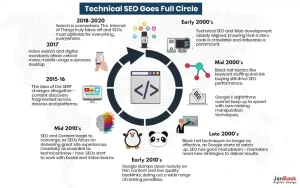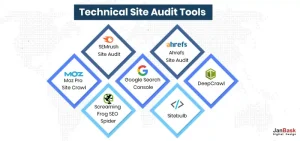
In search engine optimization (SEO), a technical SEO audit is a vital process that helps businesses optimize their website's performance and improve their rankings in search engine results.
Businesses can identify and address technical issues hindering their website's visibility and user experience by conducting technical SEO audit services. By following these steps, businesses can ensure their website is technically optimized for maximum search engine visibility and user satisfaction.
In this article, we will explore a step-by-step guide on how to do a technical SEO audit in six simple yet effective steps. So, let's dive into the world of technical SEO and unlock the secrets to a perfectly optimized website.

Looking for Technical SEO Audit Services?

Staying ahead of the competition in digital marketing requires a comprehensive understanding of search engine optimization (SEO) strategies. One crucial component of an effective SEO campaign is a technical SEO audit.
A technical SEO audit is a meticulous examination of a website's technical aspects to identify and rectify any issues hindering its performance in search engine rankings.
It involves scrutinizing website speed, mobile-friendliness, site structure, indexability, and crawlability. Businesses can optimize their online presence and improve visibility to potential customers by conducting technical site audits.
According to a study by Backlinko, websites that address technical SEO issues have 15% higher organic traffic on average than those that neglect them. This statistic highlights a technical SEO audit's significant impact on a website's success.
Professionals use advanced technical site audit tools and software to assess various parameters for a technical website audit. These tools provide in-depth analysis and valuable insights into a website's performance, including areas for improvement. For example, software like SEMrush and Moz's Site Crawl can crawl websites to identify issues like broken links, duplicate content, or missing meta tags. These tools give marketers a comprehensive overview of a website's technical health and take necessary actions to enhance its SEO performance. We will be learning in-depth about technical site audit tools in this article.

In addition to the technical benefits, a technical SEO audit contributes to improved user experience. By optimizing website speed, ensuring mobile responsiveness, and enhancing overall usability, businesses can provide a seamless and engaging experience for their visitors. Therefore, addressing technical issues through technical site audits positively impacts SEO, reduces bounce rates, increases user engagement, and ultimately boosts conversions.
In conclusion, a technical SEO audit is essential for any business aiming to optimize its online presence. By thoroughly analyzing a website's technical aspects, addressing issues. By leveraging advanced specialized site audit tools, businesses can enhance their SEO performance, drive organic traffic, and provide a seamless user experience. Investing in a technical website auditing process sets the foundation for long-term success in the ever-competitive digital landscape.
When it comes to optimizing a website for search engines, numerous factors come into play, influencing its SEO performance. Understanding these factors is crucial for businesses aiming to improve online visibility and attract organic traffic. Conducting a technical SEO audit and following a comprehensive technical SEO audit checklist can help identify and address these factors. Let's explore key elements that significantly impact a website's SEO performance, backed by relevant statistics and data.

Website Loading Speed: Website speed is a critical factor that affects user experience and search engine rankings. According to Google, 53% of mobile site visitors abandon a page that takes longer than three seconds to load. Therefore, optimizing website loading speed is crucial for SEO success.
Mobile Responsiveness: With the rise of mobile devices, having a mobile-friendly website is imperative. Google has shifted to mobile-first indexing, prioritizing mobile-optimized websites in search results. Statista shows that as of April 2023, mobile devices accounted for over 58.33% of website traffic worldwide. Therefore, ensuring your website is responsive and provides a seamless experience across various devices is vital for SEO.
Content Quality and Relevance: High-quality, relevant content plays a significant role in SEO performance. Well-written, informative content that aligns with user intent and incorporates relevant keywords can improve search engine rankings. According to HubSpot, businesses that publish 16+ blog posts per month get 3.5 times more traffic than those that publish 0-4 posts.
On-Page Optimization: On-page optimization involves optimizing various elements within a web page, including meta tags, headings, URLs, and keyword usage. According to a study by Backlinko, pages that include a target keyword in their URL tend to rank higher on Google's search results. Additionally, adequately structured headings (H1, H2, etc.) and optimized meta tags contribute to better visibility in search engines.
Backlinks and Link Building: Building high-quality backlinks from authoritative websites is crucial for SEO. According to a study by Ahrefs, there is a strong correlation between the number of referring domains (websites linking to a page) and organic search traffic. Websites with more unique backlinks tend to rank higher in search results.
By employing technical SEO audit tools and a free SEO audit checker, businesses can assess their website's performance and generate a comprehensive technical SEO audit report. These tools provide valuable insights into a website's SEO, including technical issues, backlink profiles, keyword rankings, and more.
Multiple factors influence a website's SEO performance.
Conducting a technical SEO audit, following a technical SEO audit checklist, and utilizing tools to assess and address these factors can significantly enhance a website's visibility, organic traffic, and overall SEO success. By focusing on website speed, mobile responsiveness, content quality, on-page optimization, and link building, businesses can create a solid foundation for SEO excellence. Let's explore each subtopic involved in conducting comprehensive technical site audits, along with examples and statistics to support them:
Spot and Fix Crawlability and Indexability Issues: Use technical SEO audits software like Screaming Frog or SEMrush's Site Audit to identify crawl errors, broken links, or blocked pages. For instance, according to a study by Moz, websites with broken links experience an average of 30% drop in organic traffic. Addressing these issues ensures that search engines can effectively crawl and index your website's content, improving visibility and organic rankings.
Audit Your Site Architecture: Evaluate your website's structure, URLs, and navigation to ensure a logical and user-friendly experience. Optimize your site architecture to enhance SEO performance. For example, a study by Backlinko found that websites with a flat site architecture tend to rank better in search engine results. By organizing your site hierarchy, optimizing URLs, and improving navigation, you facilitate search engine crawling and provide a seamless user experience.
Fix Internal Linking Issues: Internal links are vital in guiding search engines through your website and distributing link authority. Audit and optimize internal links to ensure they are relevant, properly labeled, and contribute to a robust information hierarchy. Moreover, websites with solid internal links have higher search engine rankings and organic traffic. You can improve your website's overall structure and authority flow by fixing internal linking issues.
Spot and Fix Duplicate Content Issues: Duplicate content can harm SEO efforts by confusing search engines and diluting your website's visibility. Conduct a thorough analysis using tools like Copyscape or Siteliner to identify and resolve duplicate content issues. Google's Panda algorithm explicitly targets websites with low-quality or the same content, leading to potential penalties or drops in rankings. By addressing identical content issues, you can ensure that search engines recognize your unique content and improve your website's search engine visibility.
Audit Your Site Performance: Use tools like Google PageSpeed Insights or GTmetrix to monitor your website's performance. By optimizing image sizes, minimizing code, and leveraging caching techniques, you can improve your website's performance, user experience, and search engine rankings.
Discover Mobile-Friendliness Issues: With the increasing use of mobile devices for internet browsing, ensuring your website is mobile-friendly is crucial. Use tools like Google's Mobile-Friendly Test to identify and resolve mobile usability issues. By optimizing your website for mobile devices, you provide a seamless experience to mobile users, improve engagement, and increase your chances of ranking well in mobile search results.
Spot and Fix Code Issues: Analyze your website's underlying code to identify and resolve any technical issues. For instance, excessive inline CSS or JavaScript use can impact page load times. By optimizing your code and removing unnecessary elements, you can improve your website's performance and ensure search engines can efficiently crawl and index your content.
Check for and Fix HTTPS Issues: Verify that your website uses HTTPS to establish a secure user connection. A secure connection can lead to a positive user experience and potential security risks. According to a study by SEMrush, websites with HTTPS encryption tend to rank higher in search engine results. Implementing HTTPS and fixing related issues enhances security and your website's search engine visibility.
Find and Fix Problematic Status Codes: Monitor and address any problematic status codes returned by your website, such as 404 (Not Found) or 500 (Internal Server Error). These errors can negatively impact user experience and search engine crawling. Moreover, websites with a high number of 404 errors tend to have lower search visibility. Identifying and resolving these issues ensures a smooth user experience and maintains a healthy website structure.
Perform Log File Analysis: Analyzing server log files provides valuable insights into search engine crawlers' behavior and user interactions on your website. Log file analysis can help identify crawl errors, determine the frequency of visits from search engine bots, and uncover potential technical issues. By performing log file analysis, you gain deeper insights into your website's performance, enabling you to make data-driven decisions for optimization.
By incorporating these steps into your technical SEO audit process and utilizing technical SEO audit software or services, you can identify and resolve various technical issues, improve your website's visibility, and deliver an enhanced user experience. A well-executed technical SEO audit is crucial for achieving higher search engine rankings and driving organic traffic to your website.
1. Prepare for the Audit: Gather the necessary information about your website, such as its structure, URLs, and current SEO performance.
2. Conduct a Crawl of Your Website: Utilize advanced technical SEO audit software like Screaming Frog or SEMrush's Site Audit to crawl your website.
3. Analyze Site Structure and Architecture: Evaluate the structure and organization of your website.
4. Assess On-Page Elements: Examine your website's on-page elements, such as meta tags, headings, and content optimization.
5. Evaluate Technical Performance: Analyze the technical performance of your website, including page load times, server response codes, and mobile-friendliness.
6. Review Off-Page Factors: Assess external factors that impact your website's SEO, such as backlinks, social signals, and online reputation.
In conclusion, conducting a technical SEO audit is crucial in optimizing your website for search engines and enhancing its online visibility. By performing thorough technical site audits, you can identify and address any underlying technical issues that may impact your website's performance in search engine rankings. However, a technical SEO audit requires expertise and in-depth knowledge of SEO best practices. That's where the team at Janbask, a leading technical SEO agency, can assist you.
Technical search engine optimization agencies specialize in optimizing website performance, structure, and technical aspects to enhance search engine visibility and improve organic rankings.
At Janbask, our technical SEO audit services are designed to help businesses identify and resolve technical issues, improve website performance, and enhance overall SEO effectiveness. Our team of experienced professionals understands the intricacies of technical search engine optimization and can conduct a comprehensive technical website audit tailored to your specific needs. We utilize advanced tools and methodologies to analyze factors such as crawlability, site architecture, internal linking, mobile-friendliness, and more, ensuring your website meets the highest SEO standards.
With Janbask's technical SEO audit service, you can gain valuable insights into your website's performance, receive actionable recommendations, and implement effective strategies to boost your online presence. Whether you need assistance with on-page optimization, code optimization, or improving site speed, our team has the expertise to address all aspects of technical SEO. Trust Janbask to be your partner in achieving optimal search engine visibility and driving organic traffic to your website.
Interested in our Technical SEO Services?

1. What is a technical SEO audit?
A technical SEO audit comprehensively evaluates a website's technical aspects to identify issues that may affect its search engine performance. It involves analyzing factors like site structure, page speed, crawlability, indexability, metadata, mobile-friendliness, and more.
2. Why is a technical SEO audit important?
A technical SEO audit helps uncover technical issues hindering search engine visibility and user experience. A website can improve its rankings, increase organic traffic, and enhance overall site performance by addressing these issues.
3. What key elements to assess during a technical SEO audit?
During a technical SEO audit, key elements to assess include website architecture, XML sitemaps, robots.txt file, URL structure, internal linking, canonicalization, schema markup, page load speed, mobile-friendliness, HTTPS implementation, and proper use of header tags.
4. What tools can be used to perform a technical SEO audit?
Several tools are available to perform a technical SEO audit, such as SEMrush Site Audit, Moz Pro Site Crawl, Screaming Frog SEO Spider, Google Search Console, Ahrefs Site Audit, and many more. These tools provide insights and reports on various technical aspects of a website.
5. How often should a technical SEO audit be conducted?
The frequency of technical SEO audits depends on the size of the website, its complexity, and how frequently changes are made. Generally, it is recommended to perform a technical SEO audit at least once a year or whenever significant updates or changes are made to the website. Regular audits help ensure a website stays optimized and resolves any new technical issues that may arise.
C
This article is exceptionally well-written, providing clear and concise information on the topic.
J
I appreciate how well-structured and organized this article is, making it easy to follow along and absorb information.
E
Keeps the reader’s attention throughout the article.
R
Very informative article on technical SEO tools and audits.